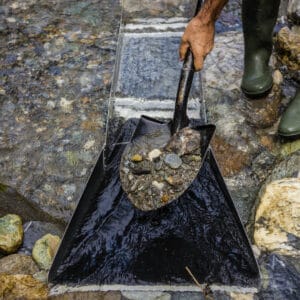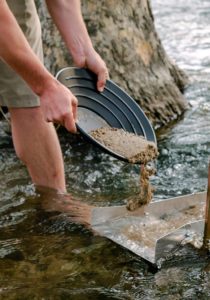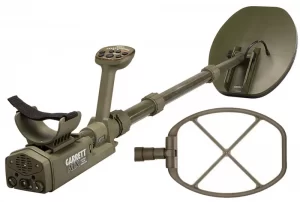Many success stories out there show what kind of money you can make if you are willing to take the time and effort to research before gold prospecting in Australia. Discover what it really takes to obtain these little nuggets.
This article will provide you with everything you need to know about the Australian gold prospecting season, from where you can go, to what you need to succeed. Come with us now, and take a deep dive into the facts everyone needs to know before mining gold in Australia.
Gold Prospecting In Australia F.A.Q’s
Table of Contents
When Is Gold Prospecting Season In Australia?
Due to Australian summers’ extreme heat and humidity, the prospecting season is mainly considered throughout March and December, with the best conditions being during April, May, September, and October.
This timeline can change depending on the location of prospecting.
Is it Legal to Prospect for Gold in Australia?
In Australia, the government does not have laws stating any mineral found is owned by anyone, one person, or authority. Therefore, whoever finds gold while prospecting owns the legal rights to it and its total worth. However, you still have to go through all of the proper channels.
Anyone considering heading off to Australia during gold prospecting season will need first to obtain a miner’s license (also called a miner’s right). These can be obtained for an individual prospector or a business.
Once you are approved, you can then begin mapping the locations you would like to mine and move through the process of getting approval.
The 10 Best Places to Hunt for Gold Prospecting in Australia

Are you interested in prospecting for gold in Australia but not sure where to start?
Here is a list of the 10 best places in the Country for gold mining:
- The Goldfields of Western Australia
- Fields in Queensland
- Fields in Northern Territory
- Kalgoorlie, Western Australia
- Gympie, Queensland
- Echunga, South Australia
- Bathurst, NSW
- Corinna, Tasmania
- Fields in New South Wales
- Golden Triangle in Victoria
When you decide to visit any location for prospecting, it is essential to plan and prepare yourself for the mining experience and all of the elements.
Stay Safe and Be Prepared When Prospecting
Many people get wrapped up in the excitement and tend to forget just how dangerous gold mining can actually be. You will find yourself in some remote locations that may have treacherous land and dangerous animals. You should always be fully prepared for all situations.
Water may be the single most important item you can pack when going out into nature while searching for gold. The heat and humidity can be overwhelming and disorient you and put you in a serious situation. When packing for your trip, decide how much water you will need and then double it.

Bring Proper Tools and Accessories
Create a checklist of everything you believe you will need while on your trip. Consider the location you are prospecting in, how long you plan to be out and the weather conditions for the day.
A good start to a helpful checklist would look something like the one we have provided below:
- Sunscreen
- Gold prospecting pan
- Gold metal detector
- Proper & Protective footwear
- Gloves
- Shovels for digging (large and small ones)
- Cell phone with service, walkie talkies, or some radio communication
- A detailed map of the area you are in
- A quality compass
- Your gold prospecting license
- Water
- Snacks (energy or protein bars)
- Protections from animal encounters
It would help if you also kept in mind that all of this equipment is not light, and you will be walking for long periods of time. Find a good backpack that is comfortable and supportive.
Understand Rules Regarding Prospecting for Gold in Australia?
To keep residential homes, national parks, and private property safe from miners, there are some guidelines and laws you must follow to search for gold:
- You may prospect for gold on any unoccupied crown land that is not covered in the law
- You must ask permission before mining on any private property such as farmland or residential areas
- Off-limits areas include graveyards, national parks, wildlife and nature reserves, and heritage sites
- Never use fire or explosives while mining
- Always cover any hole dug safely
- Take responsibility for any damage caused while mining
- Take responsible steps not to destroy trees or land due to fire, vehicle use, etc.
- Miners are responsible for any damage or loss during prospecting and are legally required to compensate landowners.
To find more detailed laws and guidelines for prospecting in Australia, check the information provided by the state you plan on visiting.
3 Tips For Finding Gold While Prospecting In Australia
Now that you are ready to get out there, here are a few tips to help you be as successful as possible when looking for gold.
Use a Gold Panner in Streams
One of the easiest ways to locate gold while prospecting in Australia is by using a gold panner and sifting through the top layer of gravel in small streams and waterways.
A panner is basically a strainer. You scoop up debris from the bottom of the stream and allow the dirt and musk to sift through the small holes. You then pour clean water over the top to reveal whatever is left (maybe a gold nugget if you are lucky).
For more tips for gold panning in streams, check out the post: How To Pan For Gold In Creeks With 3 Steps + Helpful Tips.
Use a Specialized Gold Detecting Metal Detector

If you are not comfortable panning through streams, you can purchase a metal detector that can detect gold material. If you are going this route, be sure you are purchasing a high-quality metal detector. Do you have questions about using a metal detector to find gold? Visit the post, Can A Metal Detector Detect Gold? Discover 4 Pulse Induction Brands That Work Best.
Map Out Recent Finds While Gold Prospecting In Australia
Pinpoint locations where other people have been successful in the past and try finding your own bit of luck in those locations.
With a little planning and a whole lot of luck, you may be able to strike it rich in Australia by being prepared, patient, and determined.
Gold Prospecting In Australia Conclusion
Gold prospecting in Australia may look a little different depending on which state you head out to and the season. However, all of the “land down-under” is known for its heat and humidity, a wide variety of dangerous animal species, and rough terrain, so it is crucial to devise a plan ahead of time and stick to it.

